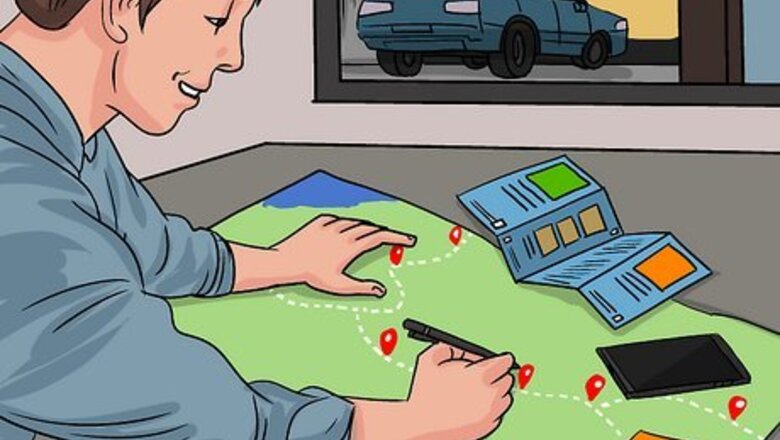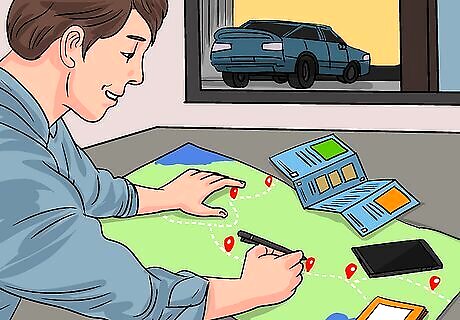
views
Plan out your route so you can shop around.

A little advance planning can help you save in the long run. Spontaneity is great, but if you leave your trip up to chance, you could find yourself getting sleepy in an area where rooms are really expensive—or entirely nonexistent. Mapping out your route ahead of time means you'll be able to research different hotels online to find the best deals out there. Start by choosing a destination, then research cool attractions you might want to stop at along the way. To give yourself plenty of time to explore, plan to drive around 5-6 hours a day. If you'd rather cover a lot of ground, drive about 8 hours each day. Once you know where you're going and how far you want to go each day, look for hotels close to your planned stopping points.
Make reservations ahead of time to lock in the best price.

Just make sure they're refundable in case you get a better deal. Once you have your route planning, start looking for hotels close to your planned stopping points. Compare rates from different hotels at each point. Once you find the rooms with the lowest rates, book them to ensure the rate doesn't go up later. On the other hand, you can sometimes find really inexpensive rooms in the last 24-48 hours before your stay. Be sure you check one last time for deals before you leave home—you might even want to check while you're on the road. If you do find a better last-minute deal, drop your reservation and switch to that one. If you're planning your road trip with the help of a traveling agent, ask them to make lodging arrangements ahead of time to avoid problems.
Plan to stay a little away from tourist attractions.

Hotel prices are usually higher in high-demand areas. If you'll be stopping by any big cities, popular destinations, or famous landmarks, consider visiting them earlier in the day. That way, you'll be able to get in some driving before nightfall, and you may be able to make it to an area where the prices are lower. If you're planning to stop somewhere that you'll do a lot of walking, it might be worth paying the extra money to stay nearby that night—sightseeing can be really tiring, and it's not safe to drive when you're exhausted.
Check whether you have any hotel points on your credit card.

Some rewards programs can be used for hotel stays. Check your credit card statement or their app or website to see if you have any points. If you do, trade them in for credit towards a room! The process for redeeming your points will vary depending on the card you have, but in general, it's best to do this a couple of weeks before your trip, because the transfer can sometimes take a while to process.
Apply for travel loyalty programs that can help you save.

Get discounted rooms and earn free nights. If you already have a membership with a loyalty program, you might have discounts or free nights built up already! But even if you don't, there's often an incentive to sign up, like a certain percentage off your first room. For instance, if you're booking through Expedia, you could sign up for Expedia Rewards to earn points. You can also link other rewards programs to Expedia. You could also sign up for a loyalty program with a certain chain, like Motel 6 or Travelodge.
Look for deals on coupon sites.

You can sometimes find discounts on travel and hotels. Sites like Groupon and RetailMeNot often have access to travel deals you might not find anywhere else. It's a good idea to check them out before you book—you can sometimes find deals for 20-30%, cash rebates, and more. You can also get hotel discounts if you're a member of a program like AAA or AARP.
Check out several major travel search engines.

Booking websites compile a ton of hotels to get you a good deal. Just plug in where you're planning to stay that night and compare prices and amenities. However, be sure to run a search on several different sites—you can sometimes get different results depending on where you look. Some popular options include: Priceline Booking.com HotelsCombined Hotels.com TripAdvisor Hotwire Kayak Trivago
Call the hotel before you book to compare prices.

Sometimes a hotel will quote you a lower price over the phone. However, don't call until after you've compared prices through the booking apps. Sometimes the hotel will quote you a higher price initially, but will agree to match a lower price that you found online. You can also sometimes save online booking fees by booking directly through the hotel.
Check last-minute booking sites before you leave.

Some sites offer steep discounts on unsold rooms. You can also sometimes find deals on rooms that were previously reserved, but that someone canceled on. These aren't a sure bet, though, which is why it's still best to book a room early. Also, keep in mind that sometimes you won't find out the name of the hotel until after you book. Popular sites for last-minute deals include: HotelTonight Priceline "Express Deals" Booking Now Jetsetter
Check out motels to find cheap rooms.

They're usually cheaper than hotels. Motels are technically a type of hotel, but they tend to be geared towards travelers who just need a place to stay for the night. They typically have outdoor entrances, and they may not have many amenities—but that's why they can keep their prices lower. You can sometimes find independent motels, or you can go with a motel chain like: Super 8 Motel 6 Travelodge America's Best Value Inn Red Roof Inn
Look for hotels that offer free breakfast and coffee.

That's one meal a day you won't have to pay for at all. Choosing a hotel with fewer amenities usually means you'll save money on the room, but there are times when it's worth paying more for certain perks. For instance, if you stay at a place that offers coffee and a continental breakfast, the savings on a restaurant meal could easily offset any additional cost of the room—especially if you're traveling with several hungry people!
Choose a room with a kitchen to save big on meals.

Cooking dinner yourself can be a lot cheaper than a restaurant. Dinner is usually the most expensive meal of the day. If you can find a room with a full kitchen, you'll be able to prepare your own food and save money. Even if it costs a little more for that type of room, it could end up saving you way more in the long run, especially if you prep meals for several days while you're there. Extended-stay hotels often include a refrigerator and microwave, and some even have a stove. Keep in mind that you may need to bring your own kitchen tools like pans, knives, cutting boards, utensils, and dishes.
Camp or stay at a hostel to really cut costs.

Skip the room altogether if you're on a really tight budget. There are plenty of options that are easier on your wallet than a hotel, although you might not get the same amenities. For instance, if you're traveling at a time of year when the weather will be nice, you could set up tents at campsites along your route. You could also just sleep in your car if it's roomy enough, as long as you find somewhere it's legal to park overnight. Sites like Couchsurfing.com will connect you with people who might be willing to let you stay for free. You might also try to find an inexpensive short-term rental through a site like Airbnb, VRBO, or Homestay. Hostels are usually an inexpensive alternative to a hotel, although you might not have much privacy. If you can borrow an RV, that can be an inexpensive option, although buying or renting one will likely end up costing you more than a hotel.




















Comments
0 comment